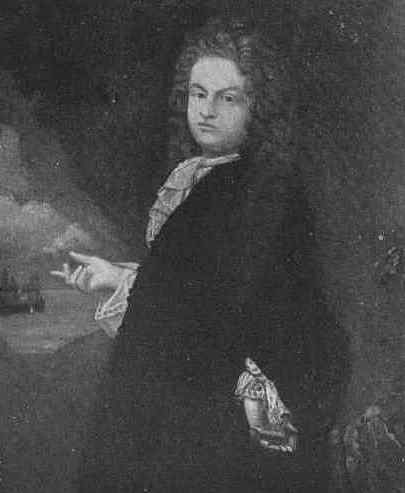
Frederick Philipse, first lord of Philipsburg Manor
By Mary Hoar, City of Yonkers Historian, President Emerita Yonkers Historical Society, recipient of the 2004 Key to History, Member of the Yonkers Landmarks Preservation Board, and President Untermyer Performing Arts Council
Monday, April 15th
April 15, 1932: Yonkers’ Joe Lapchick led the world basketball champion Celtics in a game against the Caseys (K of C team) on the Knights of Columbus court. The Celtics won, with Lapchick starring at center.
April 15, 1952: While being weighed on the city scales at Wells and Woodworth Avenues, a Capitol Van Lines truck suddenly rolled off the scales, knocked down an electric pole, damaged a parked car owned by YPD Lt. Lawrence Shea, damaged a fire hydrant, and landed by the doorway at Weber’s Restaurant, 31 Dock Street! The driver said he was not in the truck, so didn’t see the accident, but claimed the emergency brake was on. He received a summons for damaging city property.
April 15, 1952: County Court Judge Arthur Brennan announced he would recuse himself from presiding in the first-degree murder trial for former County Parkway Policeman Stanley LaBenskey of Yonkers. LaBenskey was accused of murdering African American brothers James and Wyatt Blacknall after objecting to the men being in the same bar on Riverdale Avenue. The men were shot outside the tavern. Another Blacknall brother and a friend, escaped. Judge Brennan, formerly on the County Park Commission that had charge of the Parkway Police, believed this constituted a conflict of interest..
Tuesday, April 16th
April 16, 1907: Harold Caparn, who laid out and landscaped Grant and Columbus Parks in Yonkers and designed private estates, advocated for design regulations while speaking to the Yonkers Civic League about “The City Beautiful.”
Then landscape architect for the Bronx Zoo, he designed the Entrance Concourse, Central Court, and laid out the open-air animal areas. Caparn opened his landscape architecture office at 46 Warburton Avenue in 1898; so successful, he moved his office to Fifth Avenue a few years later.
April 16, 1919: A welcome home and memorial in the Lockwood section for men who served in the armed forces was held at School Five. A bronze tablet with the names of the war dead would be placed on a boulder on the lawn in front of the school.
April 16, 1948: People entering Judge Fay’s courtroom on Woodworth Avenue were surprised to find a woman seated in the court stenographer’s chair, taking testimony! Stenographer Ruth Keno of the Probation Department was pressed into service when the regular court stenographers were busy elsewhere. Judge Fay complimented Keno at the end of the trial for doing a great job “on a second’s notice.”
Wednesday, April 17th
April 17, 1685: Frederick Philipse and John Pell agreed the Bronx River would be the boundary between their lands.
April 17, 1861: One hundred Yonkers men met at Farrington Hall to enlist “in defense of the Union.” One of the first three men to sign up was eighteen-year-old John Peene, scion of the Peene waterfront dynasty. Peene later served two terms as Republican Mayor of Yonkers from 1894 to 1897 and lived at 140 Warburton Avenue.
The first time he ran, he defeated celebrated author, humorist, satirist and editor John Kendrick Bangs by 207 votes. A few months later, Bangs turned his defeat into the literary gem “Three Weeks in Politics” and sold 60,000 copies. The NY Times dubbed this work as “Mr. Bang’s Way of Getting Even.”
Thursday, April 18th
April 18, 1919: The Hastnai, a 1500-ton wooden steamship built for the Emergency Fleet Corporation of the US Shipping Board, was launched at the Ludlow yard of the Continental Shipbuilding Corporation, a World War I Industry, and christened by Lucille Pierce. Two thousand people witnessed not only the largest ship launched in the history of Yonkers, but also the largest “side-launching” ever on the US Atlantic seaboard.
The Hastnai was named by Mrs. Woodrow Wilson.
April 18, 1921: Mayor William Wallin asked the Simon Borg Estate for permission to use Pelton Field to play summer baseball. The Estate was promised Yonkers would grade the field and put it in good shape.
April 18, 1933: Members of the Yonkers Woman’s Christian Temperance Union strongly objected to grocery stores selling legalized 3.2 beer.
Friday, April 19th
April 19, 1915: Alexander Smith and Sons Carpet Company replaced workers’ three-day-a–week schedule with a four-day-a-week schedule.
April 19, 1943: The District Office of the Price Administration imposed the severest penalty ever given on a Yonkers grocer, a six-week suspension from selling any rationed food. He also was charged with making false deposits in his ration bank account.
Saturday, April 20th
April 20, 1886: Yonkers streetlights were electrified.
April 20, 1935: Parishioners of St. Denis Church in Yonkers were surprised to see famous columnist Heywood Broun, President of the American Newspaper Guild, with his wife, actress Constance Madison. Her father was Anthony Fruscello of Landscape Avenue; the Brouns spent Easter weekend with her parents.
April 20, 1946: Major Louis Bushnell, Chief Engineer of the Yonkers Building Department on military leave, was awarded the Legion of Merit Medal. The award ceremony at Rarita Arsenal in Metuchen was attended by Bushnell’s family, former Mayor Joseph Loehr, Fire Chief William Garvin and Building Superintendent John Brady.
Sunday, April 21st
April 21, 1903: The New York Central Hudson Railroad flatly refused to change the name of its Yonkers Park Harlem Division station to Crestwood.
April 21, 1942: Negotiations were in started by a large war industry to purchase eight acres of land in Sunset Park. The land, between the New York Central Railroad and the Hudson, required legislation be passed to discontinue its use as a park and public playground for use by defense industry. Legislation later was introduced in the Common Council.
Questions or comments on this column? Email YonkersHistory1646@gmail.com. For information on the Yonkers Historical Society, Sherwood House and upcoming events, please visit our website www.yonkershistoricalsociety.org, call 914-961-8940 or email info@yonkershistoricalsociety.org





